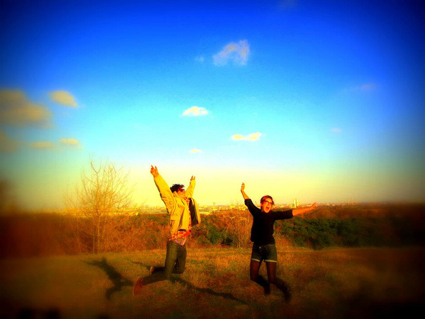 |
Jana Perkovic (right) & Enrico Pizzutilo, Berlin photo Enrico Pizzutilo |
reason for travelling
I am in Berlin on a six-month study visit, as a part of my master’s degree in urban design. My first time in Berlin was in January 2010, the coldest winter ever recorded in Europe. The temperature was -15°C, every walking surface was iced over (and people fell all the time!), the sun set shortly after lunch, and one drank alcohol purely for warmth. Despite this comprehensive state of emergency, I thought it was the greatest city I had ever visited.
poor but sexy
Berlin is the newest, the youngest, the leftest and the most welfare-dependent of all of Europe's grand old capital cities. Here the 20th century was one of disruptions. A whole third of the city was razed to the ground in WWII; then the Wall formed a wide, empty death strip through the historical centre, and many gaps are only now getting filled in.
West Berlin, an enclave of capitalism in the middle of the socialist German Democratic Republic (GDR), saw an exodus of businesses and the middle class. In their stead, students and radicals moved in, not least because citizens of West Berlin were exempt from military service. It is often said that West Berlin was as socialist as the East: its failing industry was hugely subsidised, its mindset radically left, and a large percentage of its population living on social welfare.
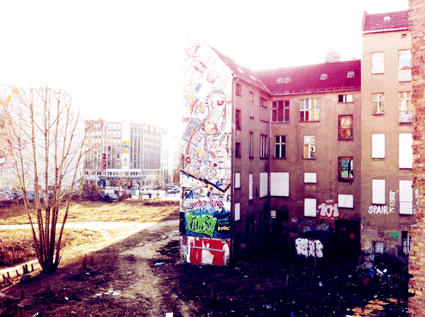 |
Berlin: 1) city centre, 2) apartment building, 3) underground on a Wednesday at 1:10am; 4) Berlin from above photos Jana Perkovic |
What young expats moving to Berlin for low rents and the hip factor don't understand is the radical left legacy this has left on the city. Every big-ticket redevelopment plan has been attacked as a flagship of gentrification, an attempt to capitalise on Berlin's "poor but sexy” chic. The creative class is decidedly unwelcome here. Still, Berlin is changing, its enormous cachet now drawing in Canadian hipsters, American DJs, Australian graphic designers, just as it once brought in anarchists and squatters.
All this makes Berlin a strange city. Not only is it indisputably uncool to have money here, the whole city has been structured for the needs of the unemployed. Op shop chic is the norm. Flea markets abound. Everyone has enormous amounts of time. Nobody looks at the brand of your bike. Anything before 3am does not count as 'going out' proper. While there is now glamour in Berlin, from the chichi shops clustered throughout Mitte, to the renovated Potsdamer Platz, there is none of that old, settled money one finds inhabiting the centres of Paris, Vienna or London. Berlin still feels like a new city, a young city, a place that might have turned its population twice over in an average lifetime.
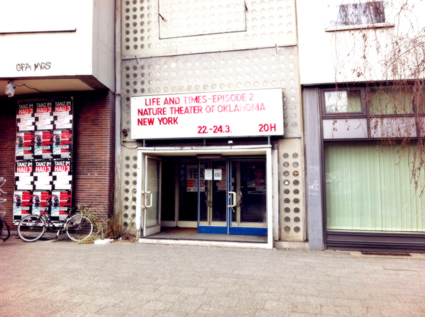 |
Hebbel am Ufer (Hau), Berlin photo Jana Perkovic |
for culture...
Berlin is home to over 50 theatres, 700 galleries, seven symphony orchestras, three opera houses and hundreds of small artistic initiatives. Attendance is heavily subsidised: opera tickets start at 10 euros, and state theatres charge five to seven euros for student tickets. German theatres have repertory seasons: instead of a series of continuous four-week seasons, each month's program consists of a large number of in-house and visiting productions, with a few performances each, scattered throughout the month. This makes it possible to see a different performance every night.
Whether you concentrate on the text-focused 'English' Schaubühne (home to Thomas Ostermeier and Benedict Andrews) or the shrine to radical Regietheater, the Volksbühne (home to Frank Castorf, Rene Pollesche and the late Christoph Schlingensief), is to some extent a question of group belonging. A few of Barrie Kosky's productions are still in repertory at Die Komische Oper, although he will stop directing when he becomes its Intendant (Artistic Director) in 2013.
Once a year, Theatertreffen brings to Berlin the 'best' 10 German-language mainstage productions, selected by a jury of critics, while Tanz im August is the city's biggest dance event. The large and uncurated Month of Performance Art takes place in May.
The most interesting performance spaces are recently established, without a fixed ensemble, functioning as production houses not unlike their Australian counterparts. Hebbel am Ufer (HAU), an amalgamation of three Kreuzberg theatres, programs everything from Rimini Protokoll to Peaches. Sophiensäle is an important space for independent performance. It sometimes seems that every house (apartment block) in Berlin is running an art event in its hinterhof (backyard). It is worth your while to go with ad hoc recommendations. Performer Stammtisch is a relatively good source of information about tiny events flying under the radar.
for refreshment...
Food in Germany will inevitably disappoint the discerning Australian palate, and let’s not even talk about the coffee. Going out here is a ‘beer&döner’ experience. Approach mid-market restaurants with caution. However, street food in Berlin is of a much higher standard than in Australia, and you are much less likely to be disappointed with a three euro meal, than with a 30 euro one.
Kreuzberg and the nearby, trending Neukölln are brimming with unpretentious little bars, with secret dancing rooms, mismatched furniture and cheap beer. Try to get to a ping pong evening at Dr Pong (Eberswalder Straße 21, Prenzlauer Berg) or Balkan Tripps (Glogauer Straße 21 Kreuzberg) where you rent a racquet and the whole bar plays together. Clash (Gneisenaustraße 2A, inside the hof), the centre of Berlin's alternative scene since the 1980s, is still going surprisingly strong.
Just outside, at Mehringdamm U-Bahn, are two of Berlin's iconic fast food joints, both worth a 2am visit: Curry 36 for its renowned currywurst (Berlin's autocthonous street food), and Mustafa's for the best döner in town. Note: most of these places allow smoking inside, so leave your underage friends and good clothes at home.
Clubbing in Berlin is an intense activity, wrapping up only around breakfast time. After 3am, try to get into Berghain, repeatedly voted the best club in the world, with velvety acoustics, strict no-photography rule, mythos of unprecedented debauchery inside and a cruel and arbitrary door policy.
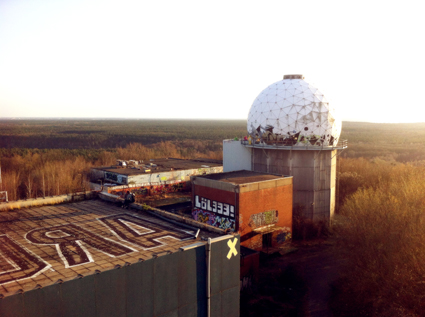 |
Teufelsberg, Berlin photo Jana Perkovic |
other recommendations...
There are many one-of-a-kind places in Berlin. One of my favourites is Teufelsberg (the rubble mountain), on the far west of the city. Buried underneath is Albert Speer's Nazi military-technical college (it was too big to demolish), but perched atop is the US listening station, monitoring USSR radio traffic. The tower is now abandoned, like Sleeping Beauty's castle, and hosts picnics, parties and kite flying.
If it is dreadfully cold, I cannot recommend saunas enough. More Australians need to be familiarised with the civilised custom of relaxing nude in large groups. For the hip experience, visit Badeschiff, a floating bar/café/pool/sauna on the Spree.
Mauerpark Flohmarkt, a Sunday flea market in the park where the Wall used to separate Prenzlauer Berg from Wedding, is now a tourist affair par excellence—a place where poor Berlin fashion designers peddle tote bags to visiting Italians. But the communal, open-air karaoke that takes place here in the warm months is truly a thing of joy. Worth visiting, if only to ponder why it is that, in Australia, such an event would be shut down in five minutes, on health & safety grounds.
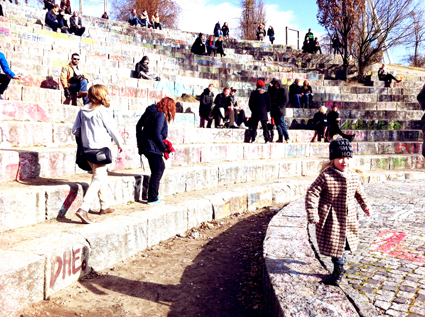 |
Mauerpark Karaoke Amphitheatre, Berlin photo Jana Perkovic |
links
Schaubühne www.schaubuehne.de/
Volksbühne www.volksbuehne-berlin.de/
Die Komische Oper www.komische-oper-berlin.de/
Theatertreffen www.theatertreffen.com/
Tanz im August www.tanzimaugust.de/
Month of Performance Art www.mpa-b.org/
Hebbel am Ufer HAU, www.hebbel-am-ufer.de
Sophiensäle www.sophiensaele.com
Performer Stammtisch www.performerstammtisch.de/
Dr. Pong www.drpong.net/
Clash www.clash-berlin.de/
Berghain www.berghain.de
Badeschiff www.arena-berlin.de/badeschiff.aspx
For more on Berlin, see Keith Gallasch & Virginia Baxter’s account of their 2009 visit.
---------------------------
Jana Perkovic is a Melbourne-based writer and urbanist. She works at Melbourne School of Design as researcher and tutor, and in various capacities as theatre critic. She is currently completing a Master of Urban Design degree at the University of Melbourne. She is a regular writer for RealTime.
You can read more about her interests in her contributor profile.
Some recent articles by Jana include:
burning issue 103
incendiary performance: christoph schlingensief
jana perkovic: interview, anna teresa scheer
RealTime issue #103 June-July 2011 pg. 24-25
love in a cold climate
jana perkovic: 2011 melbourne international arts festival
RealTime issue #106 Dec-Jan 2011 pg. 4
the mysteries of curation
jana perkovic: arts house, works from season 2
RealTime issue #105 Oct-Nov 2011 pg. 36
revelling in the now
jana perkovic: the little con, dancehouse
RealTime issue #104 Aug-Sept 2011 pg. web
© Jana Perkovic; for permission to reproduce apply to [email protected]








 back
back